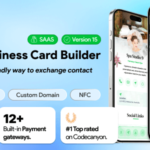The Future of Mobile Technology: Trends and Innovations Shaping Our Digital World

Mobile technology has transformed how we interact, work, and access information. From smartphones to mobile applications, advancements in this field continue to shape industries and revolutionize user experiences. As we move forward, several key trends and innovations are defining the future of mobile technology.
1. The Rise of 5G Connectivity
The rollout of 5G networks is one of the biggest game-changers in mobile technology. With speeds up to 100 times faster than 4G, 5G enables seamless streaming, faster downloads, and real-time communication.
Key Benefits:
- Ultra-fast internet speeds for lag-free browsing and gaming
- Lower latency, making it ideal for real-time applications
- Enhanced IoT capabilities, connecting smart devices more efficiently
2. AI-Powered Mobile Experiences
Artificial Intelligence (AI) is making smartphones smarter than ever. From AI-driven voice assistants like Siri, Google Assistant, and Alexa to advanced image recognition and predictive analytics, AI is enhancing user experiences across various applications.
Examples of AI in Mobile:
- Personalized recommendations in apps like Netflix and Spotify
- Smart camera features for better photo enhancement
- Chatbots and virtual assistants for customer support
3. Foldable Smartphones and Flexible Displays
Innovations in display technology are leading to foldable smartphones, offering a balance between portability and functionality. Brands like Samsung, Huawei, and Motorola have already launched foldable devices that improve multitasking and user engagement.
Why It Matters:
- Bigger screens without increasing device size
- Enhanced productivity with multi-window support
- More immersive gaming and entertainment experiences
4. Mobile Commerce (M-Commerce) Growth
E-commerce has shifted to mobile, with users preferring shopping apps over websites. Mobile payments, digital wallets, and one-click checkout options have made purchasing more convenient.
M-Commerce Trends:
- Voice search and smart assistants enhancing shopping experiences
- Augmented Reality (AR) for virtual try-ons in fashion and retail
- Subscription-based shopping models gaining popularity
5. Augmented Reality (AR) and Virtual Reality (VR)
AR and VR technologies are taking mobile experiences to the next level. From gaming to online shopping, AR and VR are providing immersive, interactive content for users.
Examples of AR/VR in Mobile:
- AR filters on social media platforms like Instagram and Snapchat
- Virtual home tours and furniture placements using AR in real estate apps
- VR-based mobile games for a more engaging experience
6. Enhanced Mobile Security and Privacy
With increasing cyber threats, mobile security is a top priority. Biometric authentication, encrypted messaging, and AI-driven threat detection are becoming standard in smartphones.
Mobile Security Innovations:
- Face and fingerprint recognition for secure access
- End-to-end encryption in messaging apps like WhatsApp and Signal
- AI-powered malware detection to prevent cyberattacks
7. The Future of Mobile Applications
Apps continue to evolve with progressive web apps (PWAs), super apps, and instant apps leading the way. These innovations ensure faster loading times, improved user experiences, and minimal storage usage.
Emerging App Trends:
- PWAs: Web-based apps that function like native mobile apps
- Super Apps: All-in-one apps that combine multiple services (e.g., WeChat, Paytm)
- Instant Apps: Apps that users can access without downloading
Conclusion: What’s Next for Mobile Technology?
The future of mobile technology is driven by faster networks, smarter AI, immersive experiences, and enhanced security. As mobile innovations continue to evolve, they will reshape industries, improve user interactions, and redefine our digital lives.








